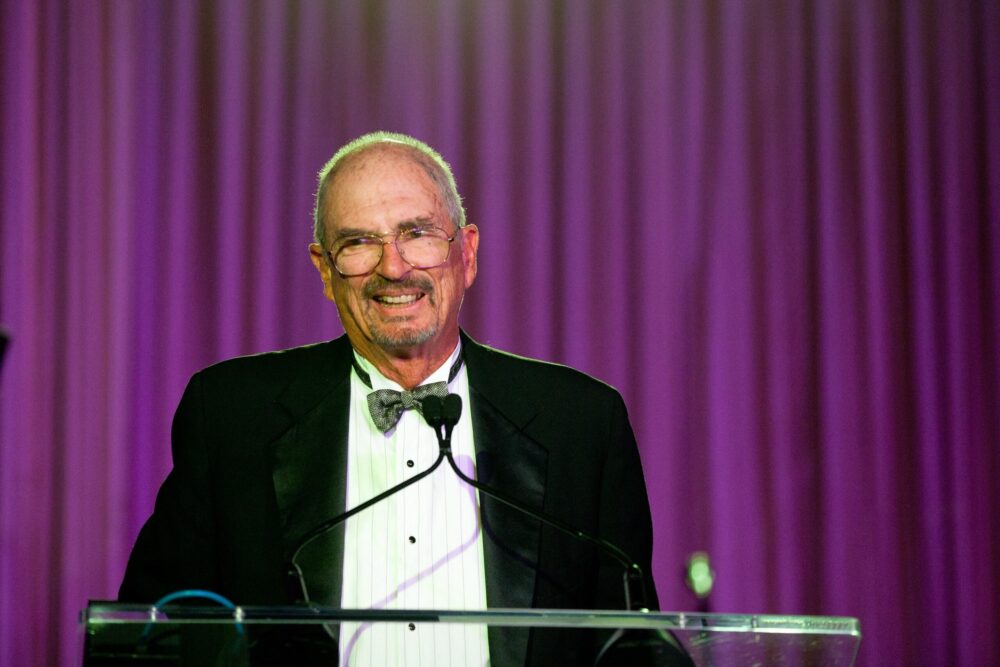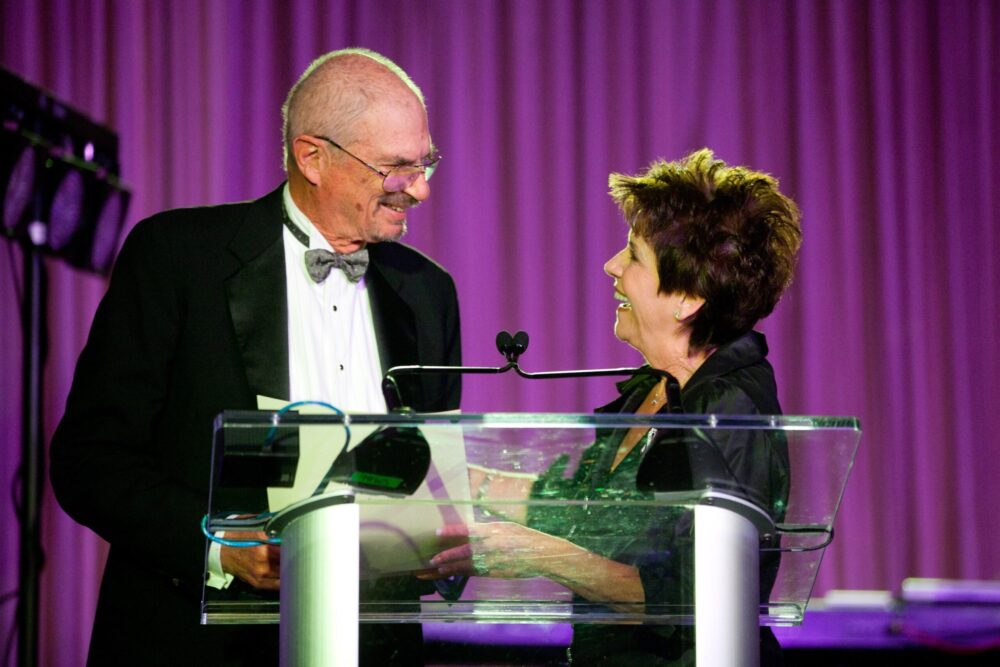Wells W. is a longtime friend of GO2 for Lung Cancer. At 91 years old, he is part of the Leadership Circle, a group of our most generous supporters.
I was diagnosed with lung cancer in 1998 at age 65. I have a BA in Chemistry from Harvard and an MS and ScD from MIT in Materials Science and Engineering. At the time of my diagnosis, I was working as a product development scientist for Raychem Corp in Menlo Park, CA. For over 40 years, I did basic research on materials and developed products.
Before I was diagnosed, I wasn’t feeling well. I was experiencing shortness of breath and a persistent cough, lost 20 pounds, and was tired and cranky most of the time. I knew something was wrong but thought it was due to being overworked, excessive overseas travel, and loss of sleep. My wife and a good friend of ours suspected differently and insisted I see a doctor. When I heard the diagnosis was stage 4 (IV) NSCLC with a prognosis of 10 months to live, I was shocked and stunned. My survival instincts took over. That afternoon, I retired from Raychem and “got to work” on my cancer.
The first step was to learn everything I could about the disease: its history, epidemiology, and treatments.
What my doctors told me was true – I was likely to die within the year. However, since I had been an experimenter all my professional life, I interviewed several doctors, got second opinions, and chose the oncologist who seemed most open to trying things even though they may not have been typical. I even got a thoracic surgeon to agree that if I could reduce my major tumor burden by 50%, he would consider doing an operation to remove it.
Several months of intensive chemo reduced my tumor by 50%. I had a lobectomy to remove the major tumor. I then did many more months of different chemo regimens to get rid of 19 small tumors that had developed because of the operation. These new smaller tumors were reduced to only 4 small ones.
This was when researchers were beginning to look at the genetics of diseases. I was able to get my tumor sequenced and found out that there was an EGFR genetic marker, which made me eligible for enrollment in a compassionate use trial (an investigational treatment for someone who has a serious or life-threatening illness) with a very new drug, Iressa (gefitinib). I also took Celebrex (celecoxib) daily to treat pain and inflammation. Many years later, several clinical trials confirmed that the drug I took was a proper course of treatment for lung cancer.
During the 1st few years, I continued extensive research, including using the internet, visiting libraries, and accessing drug companies’ websites. I even attended ASCO, a very large national meeting for oncology. I listened in on the lung cancer sessions and got to know some of the leading doctors in the field. I was not satisfied with the conventional support groups, so I started my own with male friends and relatives. I didn’t need support groups for cancer information because I got that on my own. I wanted spiritual, social, and psychological support. 
I obsessively kept records of everything: journals, reports of doctor visits, spreadsheets of medications, scan results, etc. I often knew more about my case than my doctors.
Once I was safely in a steady situation (not cured or in remission), I started speaking out. I met with others and gave talks about my story, made a 50-minute video about my journey, and started a website company. Later, I joined and chaired the Thoracic Oncology Cabinet at UCSF. After that, I co-founded the Bonnie J. Addario Lung Cancer Foundation, which merged with the Lung Cancer Alliance in 2019, creating GO2 for Lung Cancer.
So, where does all this leave me now? I am fully retired, having done several start-up projects. I do some volunteer work, primarily for lung cancer but also for civic programs and agencies and a few nonprofits. I felt so confident that I could continue to survive that I replaced one hip and both knees.
My lung cancer journey certainly has changed me. It has not only given me confidence and a sense of control over my well-being but also allowed me to face the certainty of my ultimate death and to better accept the inevitable flow of life. I continue to contribute to GO2 as a Leadership Circle member because they fund the latest research to understand the origins of disease, which will advance early detection, better treatments, and survival – and they are there for anyone diagnosed with lung cancer.
To join the Leadership Circle, contact us at donate@go2.org.

Thank you for sharing this tremendous story. I too am a lung cancer survivor. Mine was caught in a chest CT scan in 2018. Stage 1 because the scan identified it when it was about a centimeter. Upper lobectomy later that year.
I am convinced that scan is the reason I am typing this today.
I want to tell EVERYBODY that if you ever smoked or are smoking GET THE SCAN!
I am pretty sure the likes of Rush Limbaugh and many, many others would still be here.
Count me in for any efforts to get this message out.
God bless all of you going through this disease.
Hi Dave,
I am Maureen Rigney and I am with our Patient Services team here at GO2. Thanks for sharing your experiences, it means so much. A good place to start may be to participate in our our annual Lung Camcer Voices Summit, where advocates come from all over the country to Washington DC to talk with their elected officials about issues critical to the lung cancer community. Learn more and register here; https://go2.org/get-involved/events/voices-summit/
Take care,
Maureen
I was diagnosed with IV NSCLC with bone Mets when I was 43. Which made my cancer inoperable. After a year of treatments and being told to get my affairs in order and enjoy what life I had left I had to prove all my doctors wrong. I am a fighter!! Thanks to my family and God of course I started using a wellness pro machine faithfully every day and within 3 months I was cancer free! The doctors couldn’t believe it and told me I better light a candle and say thank you. I was cancer free for 13 years then one of my scans showed signs of cancer in the other lobe. This time it was caught at stage 1 so I was able to have a lobectomy and that was it. I have been cancer free for 1 1/2 years. Needless to say I shouldn’t have stopped using my wellness pro machine. I just want to tell people to NEVER ever give up hope!! But you have to fight with all your might!
Thanks so much for sharing this. I’m reading this at the perfect time as I am 9 years out from my first diagnosis and currently dealing with recurrence of the 2nd diagnosis which was EGFR+ exon 19. I’ve had an upper right lobectomy and a lower right segmentectomy within the first 7 year. I’m allergic to the Osmertinib and currently going through my 2nd attempt at desensitization. I read this as I’m here waiting to see the doctor for the results of my latest scans. The first time I’ve decided to read the results myself first. Thank you again for the reminder of remaining hopeful while doing the work I can to stay ahead and on top of my treatment plan. This 6 months have been rough but I’m ready to keep fighting! Here’s to more light and life!
Hi Donna,
Thanks so much for sharing. If we can do anything to help, don’t hesitate to reach out to us on our HelpLine (1-800-298-2436) or via email at support@go2.org.
Maureen
I need 21 years to catch up to you. First, thank you for all you do for the lung cancer community.
Congratulations on your survivorship.
At 62, I was diagnosed with Stage 4 non small cell lung cancer in November 2019. As a never smoker and no family history of LC , the diagnosis was a more than a shock. Disbelief. My lime size tumor sat at the lower left side of my lung while a walnut size one took up space on my right femur, hence causing me to have a funny gait with slight pain that we shrugged off as arthritis . A lesion the size of a green pea found a comfy spot on my cerebellum. Not sure who decided to open up a grocery store in my body, lime, walnuts , peas?
The first thing the Oncologist wanted to do is have the tumor removed from my femur. A 4 hour surgery that included a 15″ titanium rod inserted to prevent breakage followed by 10 sessions if radiation. Then came the cyber knife to my brain. A 45 minute procedure that was uneventful. I asked the radiation oncologist what was the expected success for this and he reassuringly said ” 95″. He was right. Zapped & gone.
Having the PDL1 expression allowed me to have immunotherapy, KEYTRUDA along with Alimta chemo and platinum based Carboplatin. That followed the above in Jan 20th, 2020 , my 39 th wedding anniversary.
Every three weeks I had my infusions. After 21 months the doctor said, “your results are beyond expectations.”
“You have no measurable tumors.” NED? REMISSION? Took a while for her to say it.
The side effects I experienced were hypothyroidism, microscopic colitis, entire body itch, dangerous elevated liver & kidney enzyme’s. In April 2023 they stopped the KEYTRUDA after being on it for maintenance only.
Fast forward today, scanned every three months & living a great life above ground .
My days are spent playing my guitar & harmonica, writing cancer songs, tending my vegetable garden and celebrating everyday. I volunteer at my cancer center & mentor to over 50 other LC patients through LUNGevity & Cancer Hope Network. My Facebook group has over 400 members , KEYHEADS where I offer tips & tricks for side effects and everything immunotherapy related , especially KEYtruda.
I recently was invited to speak at a charity event for LC, PRELUDE TO A CURE where we raised $25,000 for research at MSK in NYC.
My mantra is ” Don’t Count The Days, Make The Days Count”. ( Mohammed Ali)
I will speak to anyone facing this illness & tried to provide HOPE.
Google ” LENNY WEILAND” as I am on Youtube taking about my journey with LC.
Yes, a blues harmonica player with lung cancer!
Hi Lenny!
Thanks for sharing your story and for your work to bring hope and information to those affected by lung cancer.
GO2 for Lung Cancer also offers peer-to-peer connection through our Phone Buddy Program, to learn more click this link https://go2.org/resources-and-support/emotional-support/phone-buddy/
Take care,
Maureen